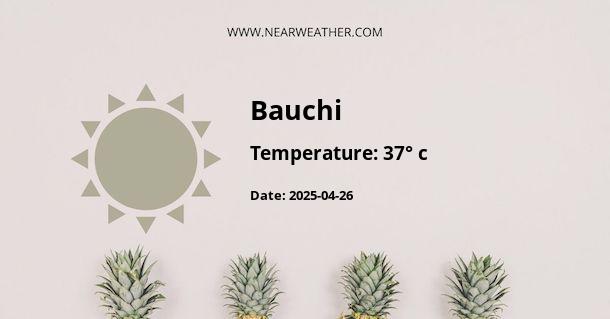Bauchi State, Nigeria: Climate and Weather Year Round
Bauchi State is located in the northeastern part of Nigeria. It is known for its diverse landscapes, cultural heritage, and unique climate. The state experiences distinct weather patterns throughout the year, influenced by its geographical location and the prevailing winds. Understanding the climate of Bauchi State is essential for residents and visitors alike to plan their activities and make informed decisions. Let's explore the climate and weather conditions in Bauchi State throughout the year.
Geographical Location and Topography
Bauchi State is situated in the Sahel region of Nigeria, bordered by seven other states. It has a diverse topography, ranging from the highlands of the Jos Plateau in the west to the plains and valleys in the east. The state's altitude varies from about 200 meters in the plains to over 1,800 meters on the plateau, resulting in variations in climate and weather patterns.
Seasonal Weather Patterns
Bauchi State experiences two main seasons: the dry season and the rainy season. These seasons are characterized by distinct weather conditions, including temperature, rainfall, and wind patterns.
Dry Season (November to March)
The dry season in Bauchi State typically begins in November and lasts until March. During this period, the state experiences low rainfall, clear skies, and low humidity. The average temperature ranges from 25°C to 35°C (77°F to 95°F), with cooler temperatures in the early morning and evening. The Harmattan winds from the Sahara Desert blow across the state, bringing with them dry and dusty conditions. These winds can reduce visibility and result in colder temperatures.
It is important to note that Bauchi State experiences temperature variations based on its topography. The highlands of the Jos Plateau have cooler temperatures compared to the plains and valleys in the eastern part of the state.
Rainy Season (April to October)
The rainy season in Bauchi State typically begins in April and lasts until October. During this period, the state experiences higher levels of rainfall and increased humidity. The average temperature ranges from 25°C to 30°C (77°F to 86°F), with occasional variations due to localized thunderstorms.
The rainfall in Bauchi State is influenced by the movement of the Intertropical Convergence Zone (ITCZ) and the southwest monsoon winds. The ITCZ is a belt of low pressure that moves northward during the rainy season, bringing moist air from the Atlantic Ocean. This convergence of air masses results in the formation of cumulonimbus clouds and frequent rainfall.
The amount of rainfall varies across the state, with the western part receiving higher rainfall due to its proximity to the Jos Plateau. The eastern part, with its lower elevation, experiences comparatively less rainfall.
Climate Variability
Bauchi State, like many other regions, is influenced by climate variability factors such as El Niño and La Niña. These climate phenomena can have significant impacts on the state's weather patterns, including temperature and rainfall.
During El Niño years, Bauchi State may experience drier conditions and below-average rainfall. This can lead to water scarcity and agricultural challenges. In contrast, during La Niña years, the state may experience above-average rainfall, which can result in flooding and waterlogged areas.
Impact on Agriculture and Economy
The climate and weather conditions in Bauchi State play a crucial role in its agricultural sector, which is a significant contributor to the state's economy. The availability of water and suitable weather conditions determine the success of crops and livestock production.
The dry season allows for the cultivation of crops such as maize, millet, and sorghum, while the rainy season supports the growth of crops like rice, vegetables, and fruits. The state's agricultural sector also benefits from its diverse topography, allowing for livestock grazing in the plains and highland farming on the Jos Plateau.
Tourism and Outdoor Activities
Bauchi State's unique climate and diverse landscapes offer opportunities for various outdoor activities and tourism. The dry season is ideal for hiking and exploring the highlands of the Jos Plateau, while the rainy season brings lush greenery and vibrant landscapes.
The Yankari National Park, located in Bauchi State, attracts tourists with its diverse wildlife, hot springs, and waterfalls. Visitors can enjoy game drives, bird watching, and nature walks throughout the year, with slight variations in experiences based on the season.
Conclusion
Bauchi State experiences a distinct climate and weather pattern throughout the year. The dry season, characterized by low rainfall and Harmattan winds, lasts from November to March. The rainy season, from April to October, brings higher levels of rainfall and increased humidity. Understanding these weather conditions is essential for residents, farmers, and tourists to plan their activities and make the most of Bauchi State's unique landscapes and cultural heritage.
A - Bauchi's Latitude is 10.500000 & Longitude is 10.000000.
A - Weather in Bauchi is 37° today.
A - Climate Conditions in Bauchi shows overcast clouds today.
A - Humidity in Bauchi is 9% today.
A - Wind speed in Bauchi is 14.9 km/h, flowing at 71° wind direction. today.
